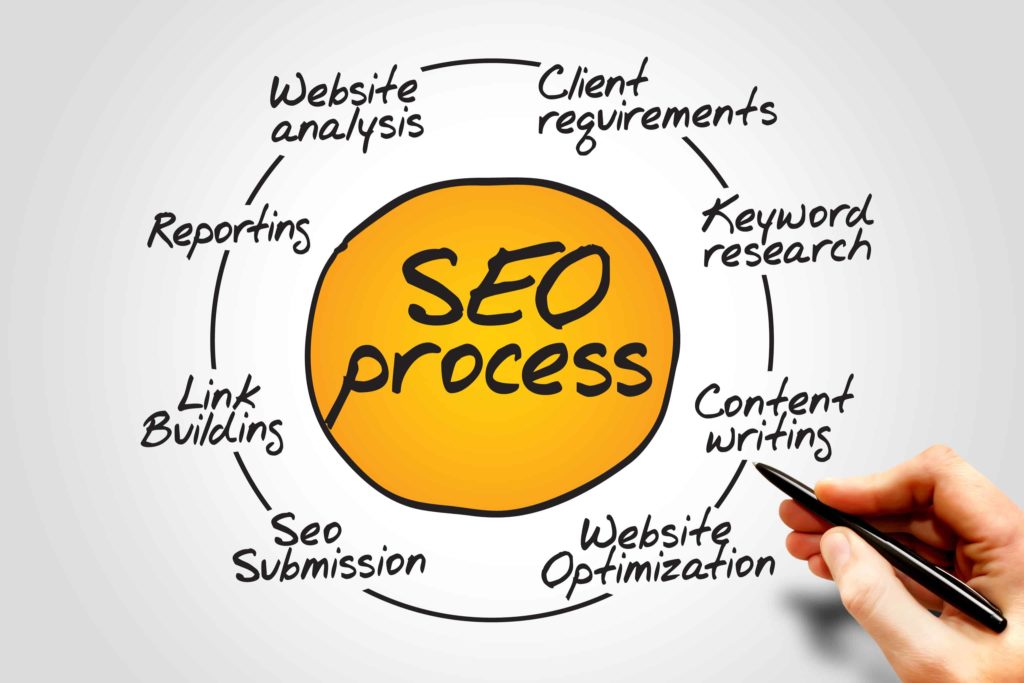A Beginner’s Guide to Search Engine Optimization (SEO)
Are you interested in learning how to improve your website’s search engine rankings? If so, you have come to the right place! In this article, we discuss the basics of search engine optimization for business, technical SEO, and how to optimize your website for Google and other search engines. We will also cover keyword research, backlinking, and other important aspects of SEO. So whether you are a complete beginner or an experienced SEO professional, require local SEO, or have an eCommerce store—this article has something for everyone!
What Is Search Engine Optimization?
SEO is the process of improving the visibility and ranking of a website or web page in search engine results pages (SERPs). In other words, SEO is the process of making your website more visible and easier to find for potential customers.
Search Engine Optimization for Beginners
An algorithm controls how search engines work. The algorithm updates to determine which websites should appear in the search results. This algorithm considers hundreds of factors, including the site architecture, the relevance of the website’s content to your search query, the website’s history and reputation, and how many other websites link to the website.

The Three Pillars of SEO
Keyword Research. Once you have identified the keywords that you want to target, you need to start optimizing your website for those terms. This includes internal links, anchor text, meta tags, images, and other elements on your page. You can use a variety of different tools and techniques, including SEO checkers, keyword density analyzers, and content optimization tools.
On-Page SEO. Once you have identified the keywords that you want to target, you need to start optimizing your website for those terms. This includes internal links, anchor text, meta tags, images, and other elements on your page. You can use a variety of different tools and techniques, including SEO checkers, keyword density analyzers, and content optimization tools.
Off-Page SEO. This refers to the tactics you use outside your website to improve your organic search rankings. Some common tactics include external links (build links from other websites back to your own), social media marketing, and search engine marketing.
Keyword Research

Keyword research is finding and selecting the best keywords to target for your website. When choosing keywords, you should consider the search volume, competition, and relevance to your website.
Finding Keywords
When it comes to SEO, keyword research is one of the most important aspects. After all, if you don’t target the right keywords, you won’t be able to reach your target audience.
How do you find the right keywords to target? The first step is to come up with a list of potential keywords. How do you find the right keywords to target? The first step is to come up with a list of potential keywords. Keyword research tools like Google AdWords Keyword Planner, Google Search Console, and semrush.com will provide insight into your user’s search intent.
Once you have a list of potential keywords, it’s essential to evaluate them based on their search volume, competition, and relevance to your website. The best keywords are those that have high search volume and low competition.
Once you’ve selected your target keywords, it’s time to optimize your website for them!
On-Page SEO Work

Optimizing Your Website for Keywords
Now that you know how to find the right keywords to target, it’s time to learn how to optimize your website for them. The first step is to include your target keywords in your website’s meta, header tags, and images.
White hat SEO uses keywords naturally on a page, while black hat techniques overuse a target keyword in headers, meta tags, anchor text, an unnaturally in page content.
How to Optimize Your Website Page Title
Your page title is one of the most important elements on your page, as it tells search engines what that specific part of your website is about. When optimizing your website page title, you want to include your target keywords.
The best way to do this is to front-load your titles with your target keywords. For example, if you’re targeting the keyword “SEO tips,” your title should look something like “SEO Tips: How to Optimize Your Website for Search Engines.”
Including your target keywords in your website title will help search engines understand what your website is about and rank it accordingly. Search Engines evaluate your website and it’s pages so that it is presented to people actively searching for that topic.
How to Write a Meta Description to Increase Your Click-Through Rate
Your meta description is the short text that appears underneath your website title on search engine results pages. Although this doesn’t directly impact your search engine rankings, it is important for two reasons:
1.) It tells search engines what your website is about, which can help them decide whether to include your website in their search results.
2.) It helps convince people to click through to your website, which can help increase your traffic.
Include your target keywords and make sure it’s interesting and convincing enough to entice people to click through to your website.
How to Use Header Tags to Improve Your Rankings
Header tags are structured data HTML elements. There are six different types of header tags, from h1 (the most important) to h6 (the least important). When optimizing your website for search engines, you want to use header tags to structure and create content to include your target keywords.
For example, if you’re writing an SEO article, you would use an h1 tag for your title, an h2 tag for your subheadings, and so on. This helps search engines understand the hierarchy of your content and index it accordingly.
Including target keywords in your heading tags will help search engines understand what your website is about and rank it accordingly.
How to Optimize Your Images
Images are a significant part of any website optimization strategy. When optimizing your images, you’ll want to include descriptive alt text using your target keywords.
For example, if you have an image of a dog, you might include “dog.” But if you’re trying to optimize your image for the keyword “cute dog,” you could say, “cute dog playing fetch.”
Including your target keywords will help search engines understand what your website is about and rank it accordingly.
Summary: 5 Tips for Quality Content
1.) Include your target keywords in your website’s title tags, meta descriptions, header tags, and images.
2.) Front-load your titles with your target keywords.
3.) Write a meta description that is interesting and convincing enough to entice people to click through to your website.
4.) Use header tags to structure your content and include your target keywords.
5.) Include target keywords in your image alt text.
6.) Avoid duplicate content and black hat SEO.
On-Page SEO Tools
SEO checkers, keyword density analyzers, and content optimization tools are all important tools for helping you optimize your website’s content for search engines. By using these tools, you can ensure that your website’s content is search engine friendly and ranks as high as possible in search engine results pages.
SEO checkers help you to identify any areas of your website that need improvement. Keyword density analyzers help you to determine the optimum keyword density for your website’s content. And content optimization tools help you to improve the overall quality and readability of your website’s content.
Off-Page SEO: Backlinks, Link Building, Business Reviews, and SEO Services
Backlinks and Link Building

Backlinking is the process of building links from other websites to your website. The more high-quality backlinks you have, the higher your chances of your website ranking in search engine results pages. The formula is simple:
Backlink From Other Website > Your Unique Perspective
Other websites = Authority | Your website = Unique Perspective
Authority + Unique Perspective = TRUST!
You can do this by submitting articles and blog posts to high-quality websites, participating in online communities and forums, and using social platforms like Twitter and Facebook.
The first step is to find high-quality websites relevant to your business and have a high Domain Authority (DA). You can use tools like Moz’s Open Site Explorer or Majestic SEO to find these websites.
Once you have found a few, reach out to them and ask if they would be interested in linking to your website. You can either email them or use a tool like HARO to connect with reporters who are looking for sources for their stories.
If you can get a few high-quality websites to link back to your website, your website’s ranking will improve dramatically. So make sure you put some effort into building high-quality backlinks!
Business Reviews

Another important factor is business reviews. When potential customers search for your business online, they will often read reviews to see what others have to say about your business.
If you have positive reviews, this will help improve your website’s ranking in search engine results pages. You can encourage customers to leave positive reviews by offering them discounts or rewards for doing so.
You can also use tools like Google Alerts to track when new reviews are posted about your business. This way, you can quickly respond to negative reviews and try to turn them into positive ones.
By getting more positive reviews, you can improve your website’s ranking in search engine results pages and attract more potential customers to your business.
For more information on how to respond to reviews, checkout our Ultimate Guide to Reputation Management for Small Business Owners.
Social Media Marketing

When it comes to search engine optimization, social media marketing (SMM) is a very important aspect to consider. After all, if you don’t target the right audience, you won’t be able to reach your future customers.
So, how can SMM help your business with SEO? The first step is to create profiles for your business. This includes profiles on sites like Facebook, Twitter, and LinkedIn.
Then, make sure you populate these profiles with valuable content that your target audience will find interesting. You can share blog posts, images, and videos on your profiles, and you can also use advertising to reach a wider audience.
The third step is to connect with your target audience. This means engaging with them by liking and commenting on their posts and answering their questions.
The fourth step is to track the results of your marketing campaigns. This means measuring the number of clicks, shares, and likes that your content receives. By tracking the results of your campaigns, you can determine which ones are most effective and then adjust your search engine optimization marketing strategy accordingly.
So, make sure you include SMM in your SEO strategy!
Search Engine Optimization Services

If you don’t have the time or resources to optimize your website yourself, you can always hire a company to do it for you. These companies specialize in optimization and can help your SEO stand out.
Just make sure you choose a reputable company that has a good track record of getting results. You can ask for case studies or testimonials from past clients to get an idea of what the company is capable of.
Hiring a company is a great way to improve your website’s ranking and get more traffic. So if you’re serious about improving your SEO, it’s worth considering.
Measuring the Success of Your SEO Efforts
There are many ways to measure the success of your SEO efforts. Some standard metrics include search engine rankings, website click through rates (CTR), and lead generation.
Google Analytics is a tool that small businesses can use to measure the number of website visitors, page views, and unique visitors. It also provides information on where your organic traffic is coming from and what devices your website visitors use. Google Search Console helps you track, maintain, and troubleshoot your website’s presence in search results.

SEO Success with Ascend SEO Marketing
SEO can be a complex and ever-changing field, but by following the basics outlined in this blog post, you can start to improve your website’s search engine ranking and visibility. Make sure you track the results of your digital marketing and SEO campaigns, so you can determine which ones are most effective and adjust your SEO strategy accordingly.
If you don’t have the time or resources, consider hiring an top rated SEO company to do it for you. By doing so, you can improve your business visibility on Search Engines and increase website traffic which will grow your business. Schedule a free consultation with Ascend SEO Marketing to start growing your business today!







